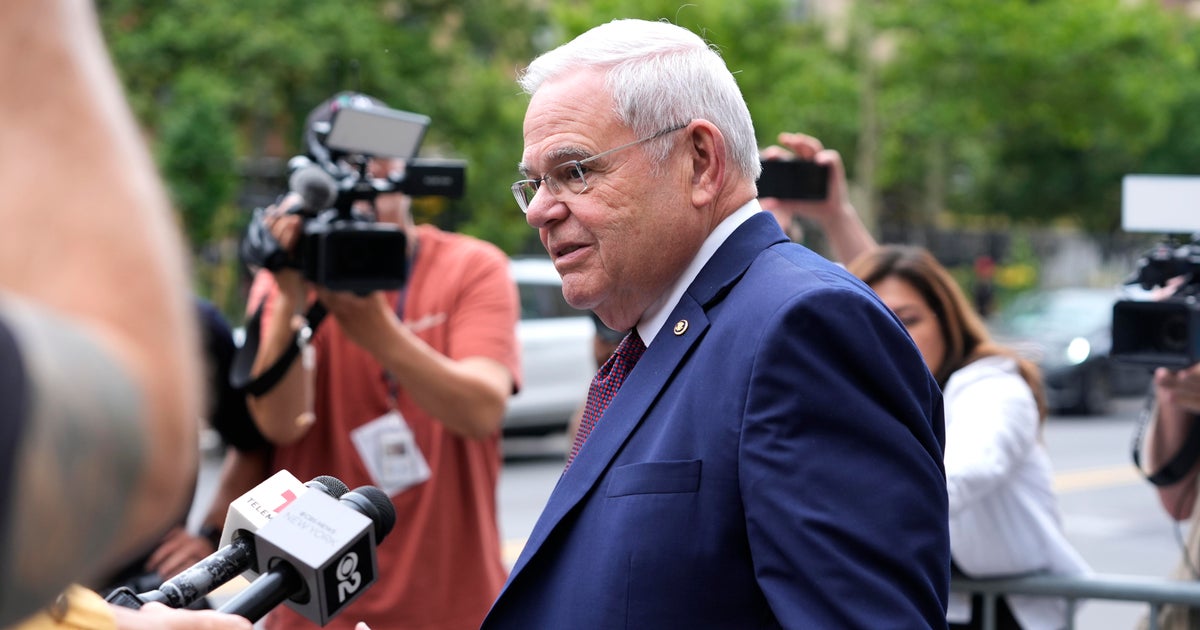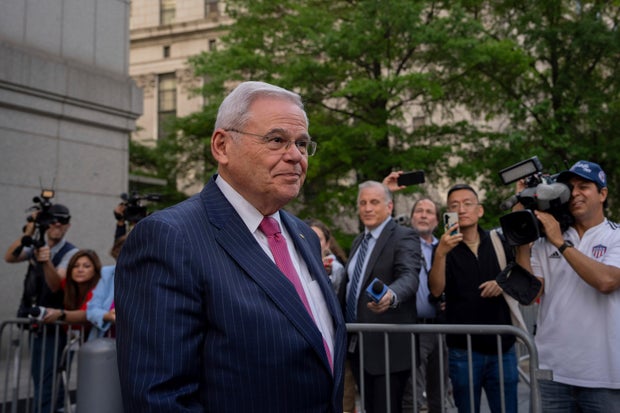CBS News
Prosecution rests in Sen. Bob Menendez’s bribery trial

Washington — Prosecutors in Sen. Bob Menendez’s bribery trial rested their case against the New Jersey Democrat on Friday, bringing an end to seven weeks of testimony from more than two dozen witnesses they’ve called to persuade a jury that the senator used his political influence to benefit three businessmen and two foreign governments in exchange for bribes.
The allegations date back to 2018, around the time the Democratic senator began dating the woman who is now his wife, Nadine Menendez, whose trial was postponed as she recovers from breast cancer surgery.
Over the last month and a half, prosecutors detailed a wide-ranging corruption scheme in which Menendez allegedly used his influence as the then-chairman of the powerful Senate Foreign Relations Committee to secretly benefit Egypt; pressured a U.S. Department of Agriculture official to protect a halal certification monopoly Egypt granted to a New Jersey businessman, Wael Hana; interfered in a criminal investigations by the New Jersey Attorney General’s Office into the associates of a second New Jersey businessman, Jose Uribe; and attempted to influence a federal prosecution of a third New Jersey businessman, Fred Daibes.
In return, prosecutors say, the businessmen provided Menendez and his wife with lavish gifts, including cash, gold bars, a Mercedes-Benz convertible, furniture and mortgage payments as Nadine Menendez was facing foreclosure on her home.
Hana and Daibes are on trial with Menendez. All three have pleaded not guilty.
Businessman says Mercedes was bribe
Adam Gray / AP
Uribe, who pleaded guilty in March, was the prosecution’s star witness, telling jurors that he bribed the senator by buying his wife a luxury car for the purpose of disrupting two state criminal investigations into his business associates. Hana, a longtime friend of Nadine Menendez, indicated that the senator and his wife could “make these things go away,” according to Uribe.
The insurance broker testified that he asked the senator directly for his help during two meetings in August and September 2019, months after he said he handed Nadine Menendez $15,000 in cash in a restaurant parking lot for a downpayment on the Mercedes. Uribe made her car payments until June 2022 — the same month the FBI searched the Menendezes’ home and found over $480,000 in cash stuffed in envelopes, coats, shoes and bags, and 13 gold bars worth more than $100,000.
“I paid for the car as an arrangement with Nadine that I will provide a car, in return for her getting Mr. Menendez to use his power to stop [the investigations],” Uribe said earlier this month.
New Jersey Attorney General Gurbir Grewal told jurors about a January 2019 call and September 2019 meeting in which Menendez raised a concern “about a pending criminal manner.”
“I can’t talk to you about this,” Grewal recalled telling Menendez.
After the September meeting with the state attorney general, Uribe said Menendez told him, “That thing that you asked me about, there’s nothing there. I give you your peace.” The senator later boasted about saving him twice, Uribe testified.
But Uribe’s credibility also came under fire during cross-examination by defense attorneys. He admitted to a long list of lies that have culminated in a number of criminal charges over the years.
An agent for Egypt?
Another piece central to the alleged scheme was a New Jersey startup owned by Hana, which prosecutors say was used to funnel bribe payments to the senator and his wife.
In April 2019, Egypt granted a lucrative monopoly to Hana’s halal certification company, setting off alarms at the Department of Agriculture. Before that, four companies had split ensuring that meat exported from the U.S. to Egypt was prepared according to Islamic law. The abrupt change confused U.S. officials because Hana’s company did not have any prior experience in halal certification and had few employees. The decision increased meat costs in Egypt and was seen as detrimental to U.S. businesses, according to several officials who testified.
The U.S. was stonewalled when it sought answers from Egypt, which officials said was unusual for the country — one of the largest recipients of U.S. military aid.
“When the Americans request a meeting, we get meetings,” Bret Tate, a former agricultural attaché in Cairo, said.
As the U.S. continued to press Egypt, Ted McKinney, a former top agricultural official, said he got a call from Menendez with the message: “Stop interfering with my constituent.”
“I felt he was telling me to stand down and stop doing all of the things that we were doing to try to revive some sense of competition in the U.S. beef market,” McKinney told jurors in May. “It was the first time I’d ever had a call that we thought would clearly harm elements of the U.S. food and [agriculture] industry.”
Menendez’s lawyers challenged the characterization of the conversation, saying he was doing his job by helping a constituent.
By that time, prosecutors alleged, Menendez was doing favors for Egyptian officials that he knew through his wife and Hana, including secretly helping the country lobby his colleagues to release $300 million in aid that had been held up over human rights concerns and providing it with details about U.S. Embassy employees in Cairo, which prosecutors argued was sensitive information.
On May 21, 2019, soon after Egypt granted the monopoly, the FBI was surveilling an upscale steakhouse near the White House, waiting for their target who had come from New York to arrive, according to two FBI agents who testified.
Two agents, undercover as a husband and wife on a date, sat on the restaurant’s patio near a group that included an Egyptian official, Hana and his business associate. Then Menendez and his wife showed up. It’s unclear who the FBI’s target was, though an agent testified that the senator was not the intended subject of the surveillance. The undercover agents snapped photos and took silent footage with a concealed video camera.
One of the agent’s testified that she heard the senator’s wife ask the other group, “What else can the love of my life do for you?” The agent did not hear the response.
With the assistance of the senator, Nadine Menendez set up a shell company in summer 2019, which was used to receive payments from a “low-or-no-show job” at Hana’s company, according to prosecutors. At the time, she was tens of thousands of dollars behind on her mortgage and facing foreclosure. Hana wired her $23,000 to save her home from foreclosure and then put her on the company’s payroll for $10,000 a month, a former lawyer for the businessman’s company testified.
Sarah Arkin, a former senior aide to Menendez, testified this week about a number of incidents involving the senator and Egyptian officials that she considered to be unusual.
Arkin told jurors that Menendez held meetings with Egyptian officials that she had not been told of, a deviation from normal practice.
For one of the meetings she was aware of, she said the senator had handwritten the invitation for the Egyptian defense attaché in Washington and Hana to visit his office. The handwritten invite was “an unusual item,” she said. When the meeting happened in March 2018, Nadine Menendez, who had just begun dating the senator, was also there.
In September 2021, when Arkin was helping Menendez prepare for a congressional delegation trip to Egypt and Qatar, she said the senator instructed his staff to plan the visit with an Egyptian intelligence officer posted in the country’s embassy in Washington. The trips, she said, were normally planned by the State Department.
“All of this Egypt stuff is very weird. I’ve never seen anything like it,” another staffer texted Arkin as they planned the trip.
Menendez’s lawyers have portrayed his interactions with Egyptian officials as another part of his job as a member of the powerful Senate Foreign Relations Committee. Menendez stepped down from his role as committee chair when he was indicted last fall.
Gold bars and Qatar
Prosecutors say Daibes, the third businessman indicted, bribed the couple with cash and gold bars in order for the senator to try to influence a federal bank fraud case against the real estate developer.
The case came up as Menendez was considering recommending his longtime friend, Philip Sellinger, to be U.S. attorney for the District of New Jersey.
Sellinger, who now holds the job, said the senator told him he thought Daibes “was being treated unfairly” by the U.S. attorney’s office and “hoped that if I became U.S. attorney that I would look at it carefully.” Sellinger testified that he told the senator he may have to recuse himself from the case if appointed because of an unrelated lawsuit his law firm had handled related to Daibes.
Sellinger said their longtime friendship ended shortly after that and Menendez told him he would no longer nominate him for the role.
But Sellinger said he “never believed [Menendez] to be asking me to do anything unethical or improper,” and the senator did eventually recommend him for the position.
As Menendez was trying to help Daibes, he was researching the value of gold online, according to evidence introduced by the prosecution. An FBI agent testified that he reviewed records including the senator’s internet search history dating back to 2008. The senator’s first search about gold was in April 2019, the agent said. After that, he repeatedly researched the price of gold.
“One kilo gold bar,” one of those searches read.
The online searches also happened as the senator allegedly used his influence to help Daibes secure a $95 million investment from a Qatari investment fund by taking actions favorable to Qatar’s government.
Nearly a dozen envelopes of cash with tens of thousands of dollars bearing the fingerprints or DNA of Daibes were found in the Menendez home, according to expert testimony and evidence shown to jurors. Prosecutors have linked some of the gold found inside the senator’s home to Daibes and Hana through serial numbers.
But a New Jersey jeweler, who testified Wednesday about selling tens of thousands of dollars worth of gold for Nadine Menendez, said he did not record the serial numbers of the gold he sold for her. The jeweler recalled that she first asked him to sell two one-kilogram bars of gold in March 2022, which fetched nearly $60,000 each.
“She said she needed to pay the bills,” he recalled, adding that Nadine Menendez told him the gold was from her family. “She had expenses in, like, home bills.”
In May of that year, she asked him to sell four one-ounce gold coins worth $7,200 and another two one-kilogram gold bars, the jeweler said. They didn’t discuss where she got them from or why she wanted to sell them, he said. The requests came weeks before the FBI executed a search warrant at the Menendez home.
Jurors also heard this week from an FBI specialist about when some of the bills found among the nearly half a million dollars in cash stockpiled in the senator’s home were issued. Evidence showed hundreds of the bills entered circulation starting in 2018, when the alleged corruption scheme began. But defense attorneys said the newer bills made up only a fraction of the stash.
What happens next
Lawyers for Menendez, Hana and Daibes have said they could call more than a dozen witnesses, beginning Monday, but haven’t said whether any of the defendants will testify themselves.
The judge told jurors last week that he expects the case will be in their hands by the end of the week of July 8.
In their opening statement and during cross-examination over the last seven weeks, the senator’s attorneys have shifted the blame to his wife, which legal experts say could backfire with jurors.
Nathalie Nieves contributed reporting.
CBS News
A unique spin on the classic holiday eggnog

Watch CBS News
Be the first to know
Get browser notifications for breaking news, live events, and exclusive reporting.
CBS News
Drone expert unpacks mysterious sightings across Northeast

Watch CBS News
Be the first to know
Get browser notifications for breaking news, live events, and exclusive reporting.
CBS News
Looking back at sports’ biggest moments in 2024

Watch CBS News
Be the first to know
Get browser notifications for breaking news, live events, and exclusive reporting.







